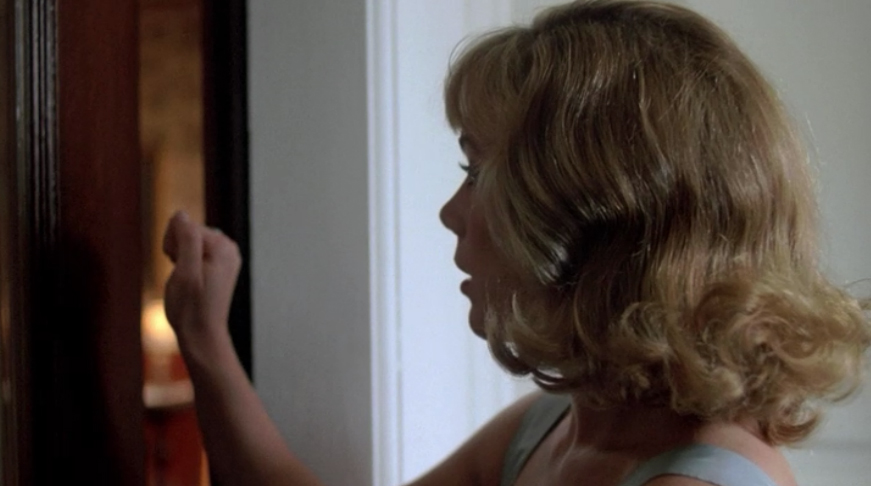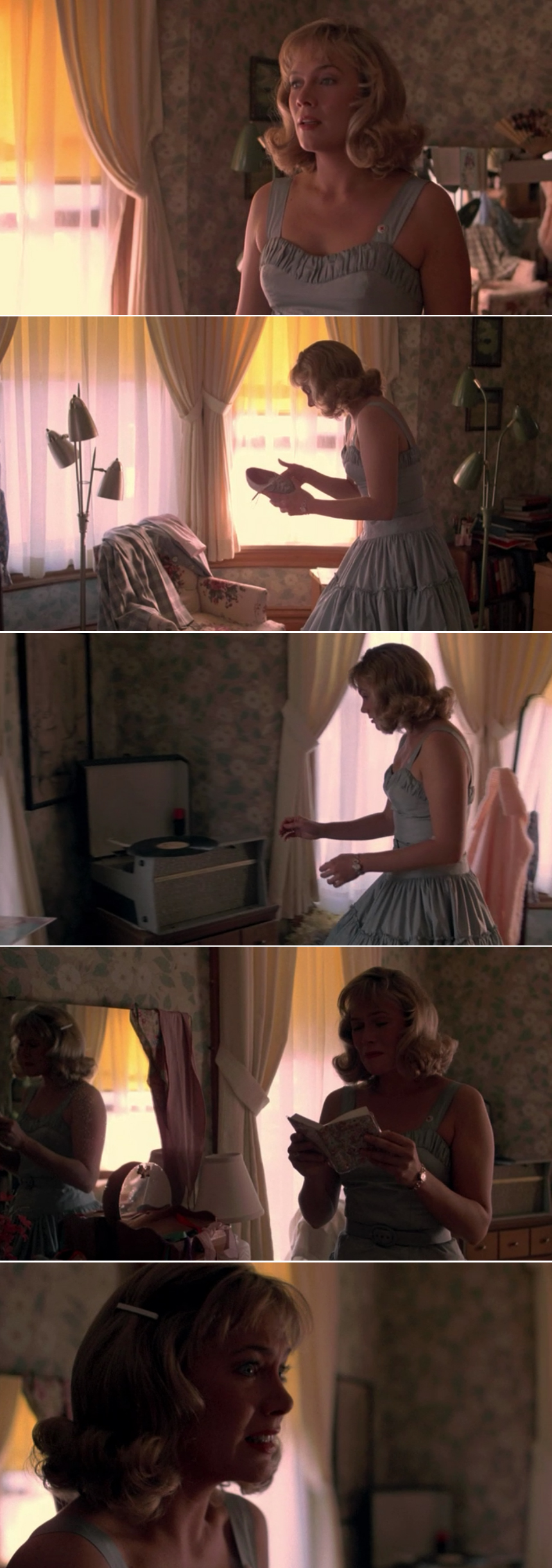Hit Me With Your Best Shot is a series where we look at favorite images and choose a "best shot" from a pre-selected movie. The moments that most define a film, elevate it, or merely gives us the most visual pleasure. "Best" is a fluid adjective. TWO WEEKS FROM NOW (June 29th) we'll be discussing Luchino Vischonti's Rocco And His Brothers (1960). Won't you join us? It's supposed to be awesome.
Francis Ford Coppola's PEGGY SUE GOT MARRIED (1986).

It's all in the transitions with Peggy Sue Got Married. And with Peggy Sue (Kathleen Turner), who begins the picture distraught over her impending divorce and ends the picture by rejecting that new future (divorce) and for the recent past (troubled marriage). In the present tense, she's attending a high school reunion (a celebration of the past) while worrying about her future. And soon, after collapsing on the reunion's stage, she's thrust back into her own past... but aware that she shouldn't be there and viewing her past from the vantage point of the future. She's always out of time.
Note the way Coppola frames her at key moments, like this one above, where he separates her from things she is very much a part of, like this 25th High School Reunion. (I figured the movie's 25th anniversary year was a good time to revisit it and I'm so glad I did.)

In the lead up to the most magical and compelling shot in the film, she returns to her childhood home and considers knocking as the door drifts open of its own accord. Again we see the heroine separated visually from the main setting of the story, but in both cases she's about to enter into the present, whichever present that is, but she's doing so very tentatively. She either doesn't want to be there or she does but happens to be terrified. It's hard to live in the present but it's even harder when that present is the past.
The best shot in the film comes very early when Peggy Sue enters her childhood bedroom. Coppola moves the camera around the room and accelerates in a dizzying circle until we're back with the middle aged woman as she rediscovers her adolescence. There are no edits (THANK YOU!) as Peggy repeats the circling, rediscovering the room she grew up in. She seems utterly bewitched by the simplest things like a shoe on the carpet, her record player, a wee book. The room is lit so softly and superbly by the late cinematographer Jordan Cronenwerth and he was deservingly Oscar nominated for this picture! [Trivia note: His son Jeff was nominated just last year in the same category for The Social Network]. When Peggy finishes her tour, we've seen Kathleen Turner go from hypnotic trance to simple joy to confusion and then back to terrified, still not at peace with her time travelling.

WHAT is going on."
This fluctuation of mood in the space of one scene, is in perfect synch with the spotty brilliance of the movie which finds funny, sad, silly and mysterious ways to dig into the crazy moodswings of those hormonally charged teenage years while simultaneously commenting on middle aged "it's all behind me" panic. You could say the same of many time travel or body switching movies, but Coppola's vision is more adult than much of this peculiar subgenre. The movie is quite funny but it's also shot through with despair. Even the finale, a "happy ending" has a strange undertow of defeatist compromise, despite the fantastical happenings proceeding it. Even if you can go home again, you can't reboot your life; you have to make peace with it.
Peggy Sue peaked early. And so it is with Peggy Sue Got Married which is wonderfully compelling in the first third, less so in the second, and sputters and collapses at the finale. In a way the movie's primary weakness is absolutely fitting. It showed such promise during its youth! Does the movie's minor reputation reflect merely that it's an older person's film -- people Peggy Sue's age, who had the most to gain from its high school in the late 50s nostalgia would be hitting 70 about now -- or is it simply a result of its own shortcomings?
Arguably the movie is only a minor footnote now, but I still love it. If it's remembered it's mostly within the context of Coppola's career and family trivia (his daughter Sofia, her accomplished filmmaking career way ahead of her plays Peggy Sue's younger sister and his nephew Nicolas Cage gets the male lead) or as the for the peak of Kathleen Turner's short-lived mega stardom. It had a disappointing Oscar run. Turner's wonderfully playful work, which is complicated but looks easy (that's Oscar death!) is still a real beauty of a star turn 25 years later. The final image that really stung on this revisit, is not a single shot but two of them, fused in a slow melancholy dissolve.

Peggy Sue has just broken up with her boyfriend again in an attempt to save them both from their 25 years-later divorce. She sits tired and despondent, lights a cigarette and we dissolve to the next scene. The beautiful thing is that it looks just like a memory: Soulful, colorful, lively... but half-imagined.

Check out these other Peggy Sue articles!
- Movies Kick Ass "Reverse Dorothy"
- The Entertainment Junkie "one woman's hall of mirrors" -- this is a really interesting take celebrating my least favorite scenes. It's making me rethink them!
- Film Actually loves the film's quotability. It does have great lines. And hair. And teeth. And eyes.
- Missemmamm really loves Peggy Sue and shared her favorite moments
- Awwww, the Movies Peggy's wild night.